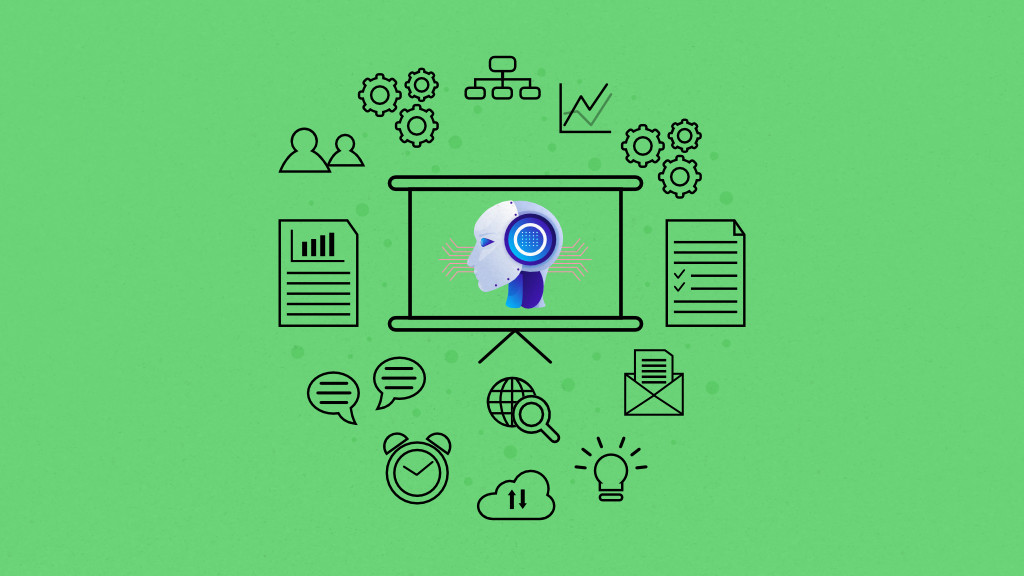Introduction
Project management is a lot to deal with. Isn’t it?
Missed deadlines, unclear communication, resource constraints, and several other factors impose a significant threat to your project execution.
But enter AI into project management, and things start looking up in your workflow.
AI project management is a smart concept that capitalizes on the power of intelligent algorithms and machine learning techniques. It transforms your project management practices by automating repetitive tasks, streamlining workflows, and optimizing project outcomes.
Apart from that, AI empowers organizations across the board to strive and thrive. And that is confirmed by Capterra’s AI in the PM survey. According to that 93% of project managers reported an increase in ROI after 12 months of AI project management tools investments.
So, how is AI going to impact the future of project management?
Let’s find out the answer to the questions by discovering some innovative applications and benefits of introducing AI to your business operations. And maybe a few drawbacks too.
But before we get into it, let’s level up our understanding of AI project management and its types for comprehensive analysis.
Read more: Explore the ways artificial intelligence is revolutionizing project managers’ role
What is AI project management?
Artificial intelligence (AI) applies advanced analysis and logic-based techniques, including machine learning, to interpret events, support and automate decisions and take actions. – Gartner
AI project management refers to the management of projects using ultimate AI assistance to streamline and enhance the standard of project management processes. The ideology behind integrating artificial intelligence in project management is to elevate the levels of efficiency, accuracy, and effectiveness.
Some applications of artificial intelligence in project management are:
- Data analysis
- Pattern recognition
- Decision making
- Collaboration
- Task automation
- Project planning
- Project monitoring
- Problem-solving
- Risk management
And many more.
AI mimics human intelligence to eradicate the complexities of traditional methods. Its swiftness gets things done with precision without burdening anyone and saving time.
For instance, AI can interpret a large amount of data in seconds, which a human may take days to process. And it does that without any error and taking rest. It eliminates every human limitation, like biases, distractions, and fatigue from roots. Project managers can utilize these data-driven insights to capitalize on opportunities and deliver optimal project outcomes.
Types of AI in project management
Some of the popular artificial intelligence types are:
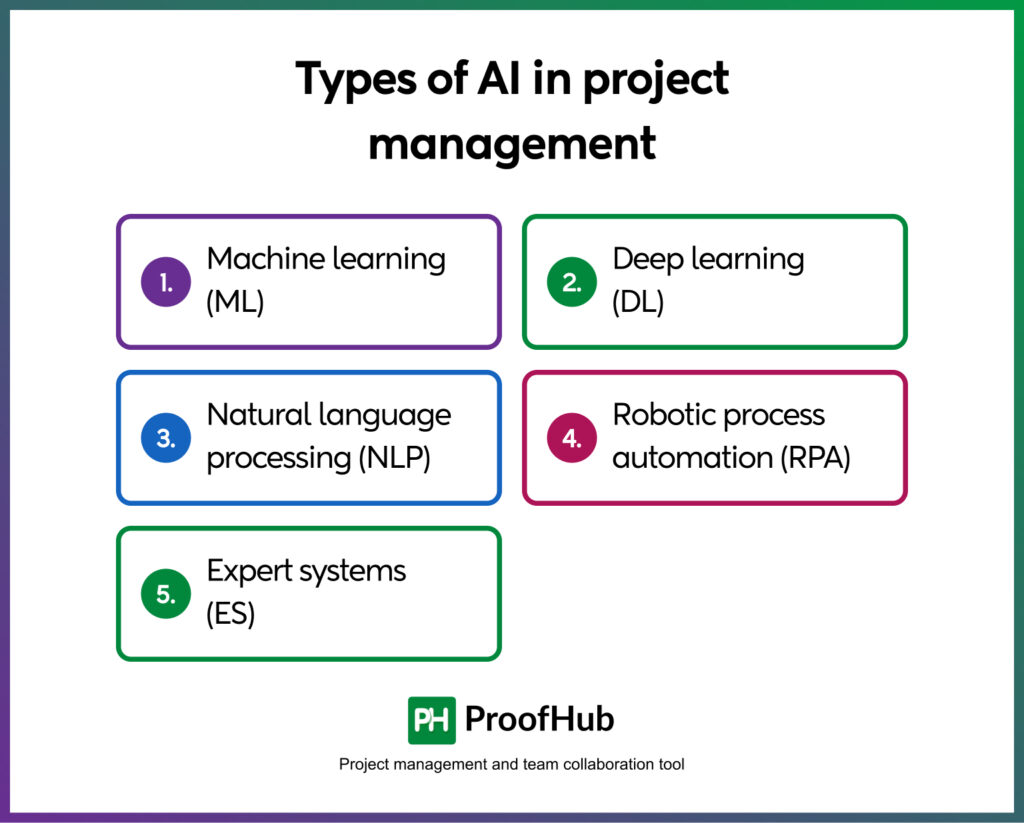
1. Machine learning (ML)
Machine learning is a dynamic concept where algorithms sort and analyze large volumes of data to learn from it. It is done to detect patterns, predict outcomes, and automate decision-making processes without any human intervention, effort, or judgment. This will save you both time and effort for data analysis.
2. Deep learning (DL)
Deep learning is a subset of machine learning that uses multi-layered neural networks to process complex data sets. Inspired by the human brain, DL can help you make accurate forecasts, track project progress, and predict future outcomes. You can use the predictions to make informed decisions and adjust your strategies accordingly.
3. Natural language processing (NLP)
The basic objective of natural language processing is to interpret and generate human language to automate administrative tasks. The interaction between human-computer applications enables real-time language translation to facilitate seamless communication. Henceforth, it allows you to focus on some other critical project aspects.
4. Robotic process automation (RPA)
Robotic process automation is a technology developed on pre-defined ‘if, when, or else’ statements to complete tasks. It follows a certain set of instructions to automate repetitive tasks in digital systems. This includes document generation, status reporting, data entry, and more to free project managers for value-adding activities.
5. Expert systems (ES)
Expert systems are computer programs that use knowledge base and inference mechanisms to mimic human decision-making. Like humans, they also get experience and expand their domain knowledge over the years. You can use this exceptional technology for advanced risk management decision-making.
Read more: Master these 9 essential skills to stay adaptive and relevant in the AI era
Examples of AI in project management
Some of the examples of AI in project management are:
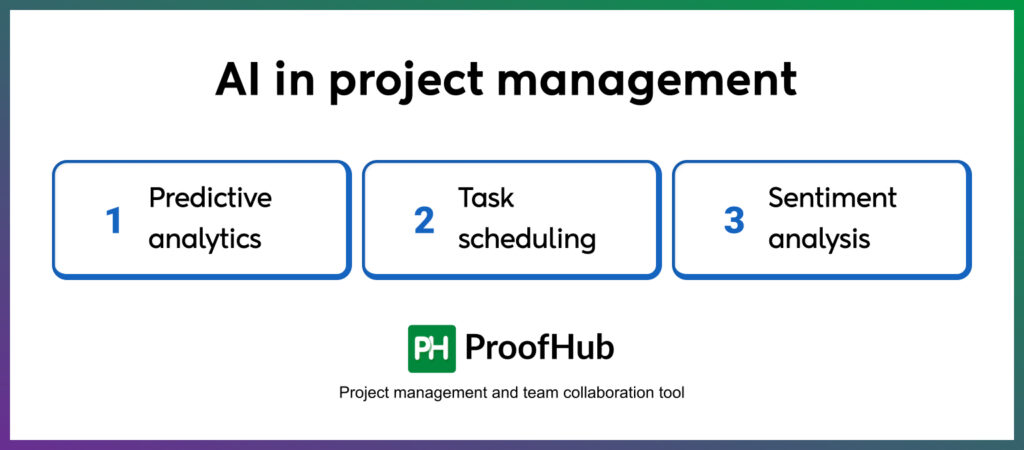
1. Predictive analytics
After thorough project planning and dedicated efforts investment into your projects, you surely won’t like encountering unexpected setbacks. And this is where AI machine learning saves you the day. It analyzes the bulk of data, past trends, and patterns to provide early warning signs, accurate predictions, and forecasts. You can utilize this information to adjust your course of action against anticipated risks even before they occur.
2. Task scheduling
Scheduling and re-scheduling tasks is a whole other task that requires project managers to be on their toes. But adding to your convenience, AI’s deep learning extends its helping hand in task scheduling. It provides some insightful suggestions based on project priorities, team expertise, and unforeseen circumstances. However, you can choose to implement it right away or intervene to adjust whatever you desire.
3. Sentiment analysis
Natural Language Processing is a transformative product of artificial intelligence that analyzes, interprets, and processes human language. It is a great relief to project managers handling administrative tasks. The primary goal is to recognize speech, entities, and emotional tone to facilitate communication and understanding. You can use it to streamline communication among teams.
Benefits of AI project management
Here are some significant benefits of AI for project management:
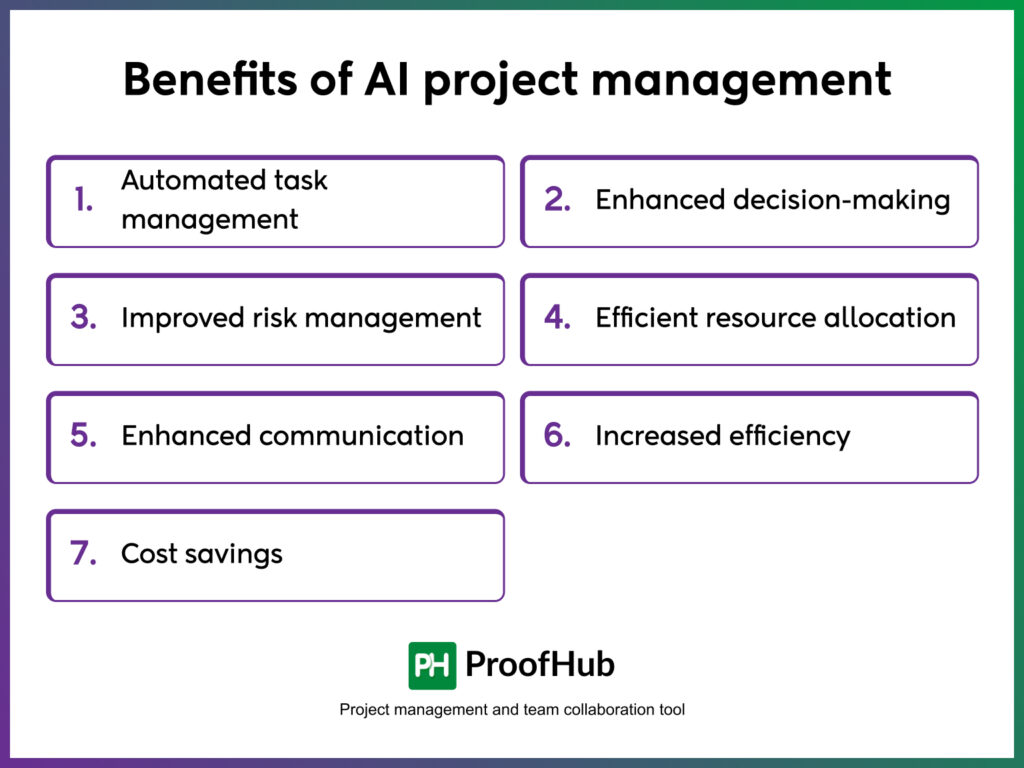
1. Automated task management
Artificial intelligence grants you more time by taking over repetitive and time-consuming tasks. It removes the need to rely on manual processes by automating various aspects, like task allocation, scheduling, and monitoring. Not just that, it also streamlines document processing, task prioritization, and data entry for you.
Read more: Transform your task management approach with our curated list of top 21 tools
2. Enhanced decision-making
AI aids you from the overwhelming experience that comes with data-driven decision-making. While some might hesitate to delve into numbers-crunching, the pace with which AI can process vast amounts of data is remarkable. With these insights in your hand, you can quickly proceed to make informed decisions.
ProofHub streamlines your decision-making process by bringing your entire project data (tasks, discussions, files) into one centralized location. You need not look around for scattered data and information to make informed decisions.
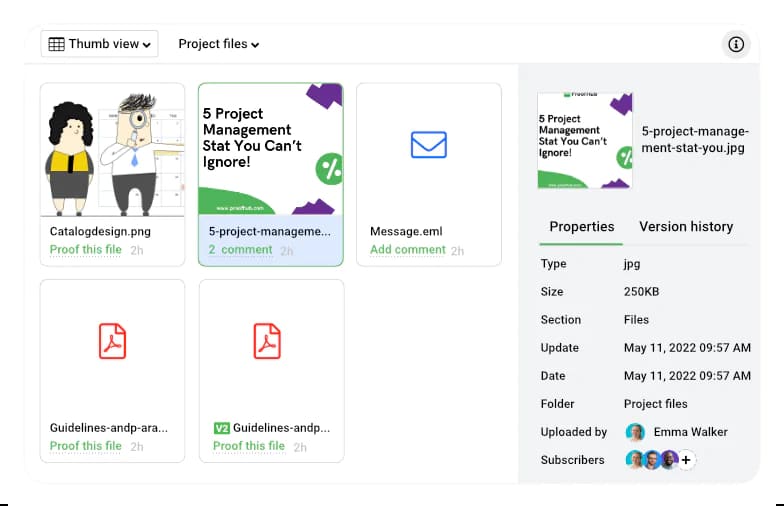
3. Improved risk management
AI-powered project management tools can help you identify risks in real time. It goes over all your historical and real-time data to analyze risk patterns, uncover threat factors, and predict future scenarios. Its quick and accurate analysis saves you from data digging, helping you take proactive measures in time.
Read more: Eliminate project risks effectively with 11 cutting-edge risk management software
4. Efficient resource allocation
AI algorithms can assist you in optimizing your resource allocation process by providing intelligent suggestions for present and future scenarios. A thorough understanding of team capabilities, project requirements, and timelines backs up all these recommendations. This means you need not waste time and leave it to AI to maximize resource utilization.
5. Enhanced communication and collaboration
AI project management tools enhance communication and collaboration between team members. Its AI-driven chatbots and virtual assistants use advanced machine learning and natural language processing algorithms to identify communication patterns and potential issues or conflicts to respond accordingly without you intervening (you can jump in whenever you want).
ProofHub brings everyone on the same page by providing a central platform for discussions, file sharing, and task updates. Additionally, there are features like built-in chat, threaded conversations, and @mentions to keep everyone informed.
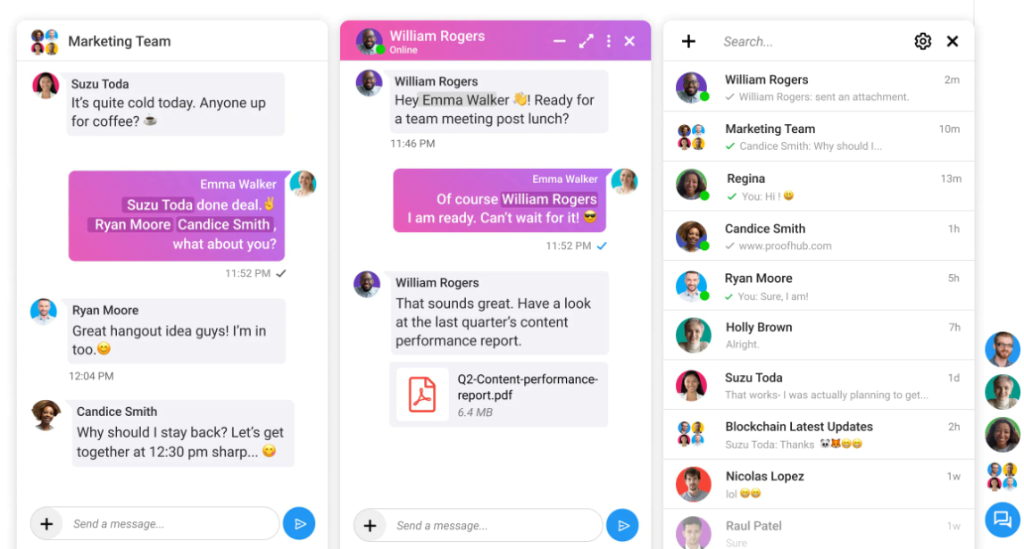
Read more: Explore our guide to 52 best collaboration tools to facilitate seamless collaboration in your organization
6. Increased efficiency and productivity
AI sure assists you in getting everything done in no time. But you get added efficiency and productivity along with it. It mitigates the chances of errors and introduces accuracy to all your data-driven processes. Not only that, it also gives a productivity boost to you and your team members, saving hours that otherwise would have cost in manual labor.
7. Cost savings
AI not only cuts down on costly errors and inefficiencies but also saves you time and money. How? It lightens your employees’ workload and reduces chances to expand your employee network. Not just that, by optimizing resource allocation, you also save your employee efforts from being wasted on unnecessary tasks. And get the most out of their skills.
While you might get overwhelmed with AI solutions, the added implementation cost is the one thing you should consider. However, there are project management tools like ProofHub with flat-free pricing and comprehensive solutions to help your teams lead toward success without a hefty investment.
Scale your organization without adding on an additional cost. Choose from ProofHub’s pricing options. No credit card. No hidden fees.
How to use AI in project management
AI is a cool new tech that’s still under development, so what it can do is change all the time.
Right now, there isn’t any one AI project management tool that can completely run your projects on its own. They’re more like assistants that help project managers be even better at their jobs, not replacements.
A survey by Zenhub found that most software teams are interested in using AI for things like planning tasks, figuring out how long things will take, figuring out what’s most important, and keeping track of upcoming work.
Here are some project management sectors where AI introduces significant benefits:
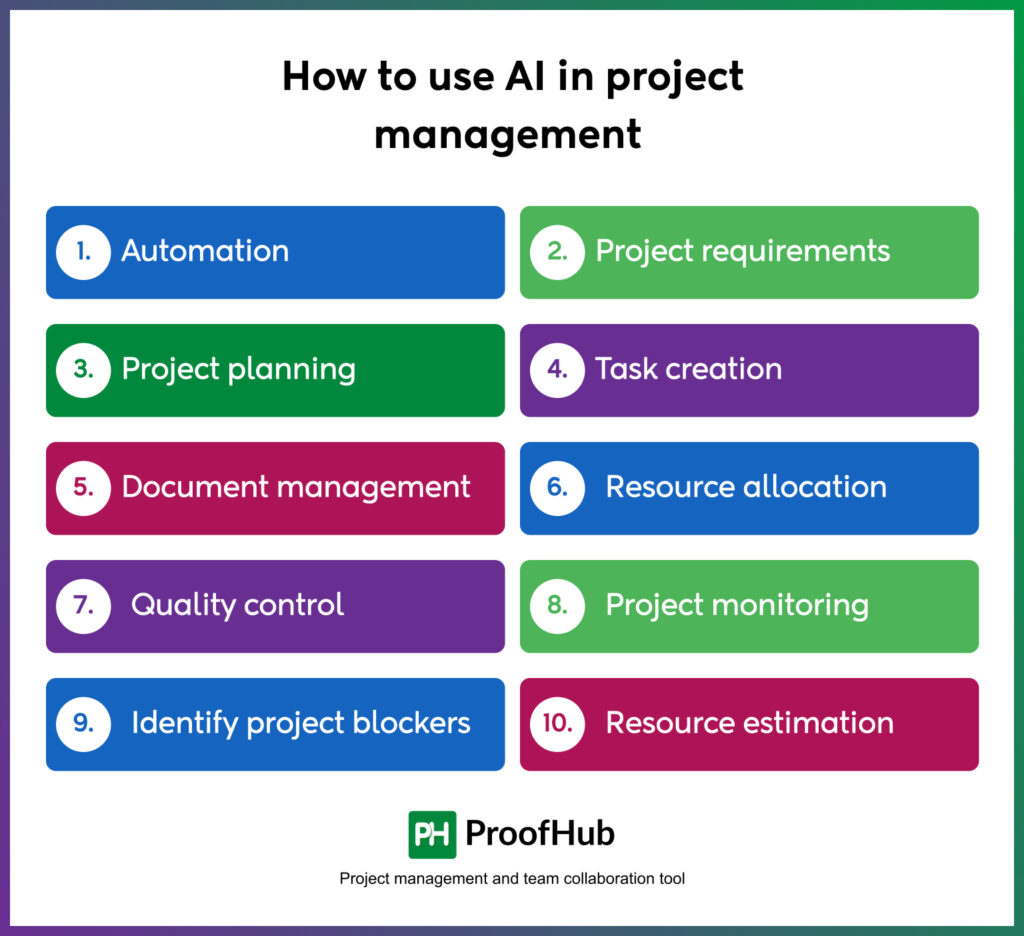
1. Automation
The major area where you can bring AI to your rescue is handling tedious and recurring tasks. You can do that by introducing automation to streamline your processes, like data entry, task reminders, status updates, report generation, and many more. This releases project managers from mundane tasks, empowering them to dedicate more attention to strategic and complex initiatives.
2. Project requirements
Before you start digging into the project directly, analyzing requirements is necessary. AI makes things easier by determining the people count, skills required, and appropriate timeframe to ensure seamless project execution. It also brings forth the ability to identify inconsistencies and uncertainties that may affect your project kickoff.
3. Project planning
There often come times when you encounter projects of a similar nature. AI helps you significantly in project planning by digging into previous data sets, identifying patterns that came up, and providing insights for you to lay out a successful roadmap.
Read more: Bring efficiency and effectiveness into your plan with the 11 best project planning tools
4. Task creation
Creating, assigning, and managing tasks is a repetitive cycle that drains your resources. AI algorithms shoulder this responsibility on your behalf by analyzing historical data, project requirements, and team members’ availability and skill sets. It identifies action items, outlines descriptions, predicts due dates, and converts them into tasks automatically. After which you can proceed with task allocation.
5. Document management
Categorizing and managing various files and documents is a whole other level of task that can take a toll on the manager’s role. But AI’s smart capabilities index documents based on parameters like keywords, content, and metadata. This makes access and retrieval of information pretty convenient.
6. Resource allocation
With multiple projects running simultaneously, ensuring optimal resource allocation can be challenging. AI optimizes the process by considering various data points, including employee skills, team and equipment availability, past project performance, and more, to enhance work distribution efficiency.
7. Quality control
During the entire project execution cycle, comparing outputs against ensured quality standards is critical. AI, when fed with data through quality metrics, automatically uncovers quality issues before these impact the delivery of deliverables. Ultimately saving your entire team from reworking efforts.
8. Project monitoring
Consider AI as vigilant eyes that will always watch over your project. It will stay on top of your project progress, performance metrics, and key milestones in real-time, eliminating the need for manual updates. It will provide proactive insights and alerts to project managers to take necessary measures instantly.
9. Identify project blockers
Regardless of how efficiently potential risks were taken into consideration in your project planning process, you cannot ensure eliminating risks from occurring. AI stays alert on project blockers and risks to prevent your projects from derailing. It even notifies you about costly delays, helping you take preventive measures in time.
10. Resource estimation
Not all projects are the same. Not all projects will require a similar investment of project management resources. AI analyzes all the past projects, their specifications, and requirements to come up with accurate estimates. Project managers can use these insights to strategize their plans accordingly.
Read more: Explore the top 9 AI project management tools to speed up your business processes
Drawbacks and considerations of AI in project management
If you are intrigued by AI project management benefits so far, bear in mind that its adoption is not without hiccups. These are:
1. Cost of implementation
No doubt, AI tools save resources like time, effort, and manpower. But the cost associated with acquiring and integrating them is something that would require you to give it a second thought. The investment of resources that goes into staff training is another aspect to be considered.
2. Data security and privacy
Around 54% of developers are concerned about the security risks AI can impose because AI’s training and functioning have relied heavily on data so far. Which, if not adequately protected, can make your data vulnerable to breaches and privacy violations. Therefore, ensuring robust data protection practices is essential to prevent data misuse.
3. Overreliance on AI
Accuracy is one admiring trait that AI offers. But you cannot afford to lose human oversight because of that. At the same time, you may feel swept away by AI conveniences, and over-dependence on AI sidelines human intuition, expertise, and judgment from out of the picture. And that could be a major reason why projects fail.
4. Biases
AI is fed data from the past. And it can be biased. In that case, you cannot expect fair outcomes and recommendations from AI, resulting in unfair outcomes and decisions. Also, AI hallucination, where it generates misleading or incorrect information, is another concern leading to biased results.
5. Accountability concerns
When AI turns into your sole driver, accountability becomes an issue. Because if things go wrong, holding AI accountable becomes challenging, leading to ethical dilemmas. And if you think AI is not prone to errors, then you are highly mistaken. Even it can have a bad day.
Read more: Explore how to hold your team accountable and create a more responsible environment
Conclusion
AI is a revolutionary concept that is advancing with each passing day, and its role in project management is only growing stronger.
Despite this, effective project management still relies on human strengths like leadership, strategic thinking, and building trust within teams.
The key lies in creating a harmonious blend. Here’s where a platform like ProofHub comes in. By providing a central hub for clear communication, organized tasks, and seamless file sharing, ProofHub lays a strong foundation for a successful AI-powered approach.
Experience the power of seamless project management with ProofHub. Start your 14-day trial. No credit card. No hidden fees.
Related articles:
- 9 essential skills project managers need to succeed in the AI era
- AI revolution: Redefining the role of project leaders
- Top 9 AI project management software managers need to know about
FAQs
How is AI used in project management?
AI is transforming project management by assisting project managers in
- Data analysis
- Decision making
- Task automation
- Resource allocation
- Problem-solving
- Risk management
And more.
Is AI taking over project management?
AI is giving a boost to project management practices and not just taking over it. It empowers the project managers by removing complexities and adding efficiency to their role.
What are the 6 stages of the AI project cycle?
The AI project lifecycle includes the sequential steps for the development and implementation of an AI project.
- Problem definition
- Data acquisition and preparation
- Model development
- Model evaluation and refinement
- Deployment
- Machine learning operations
